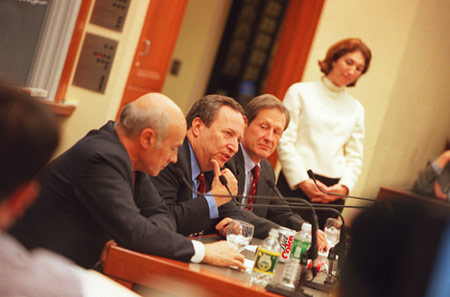‘Worldly’ education assessed
Globalization discussed at HLS

Can the nation’s oldest university, one with its roots sunk deep in American soil, embrace globalization? And what does this buzzword of globalization mean for education beyond swapping students across national borders?
An audience filled Harvard Law School’s Austin North classroom last Wednesday (March 6) to hear President Lawrence H. Summers, Law School (HLS) Dean Robert C. Clark, and Kennedy School of Government (KSG) Dean Joseph S. Nye Jr. discuss globalization in education. The University leaders were guests in the class “Globalization and Us,” co-taught by HLS Professor Anne-Marie Slaughter and KSG Professor Roberto Unger.
Slaughter opened the discussion by inviting the panelists to challenge the idea that globalization of education in the United States means simply that students from other nations should study at our universities and our students should study abroad.
At the Kennedy School, where foreign students comprise 44 percent of the student population, attracting foreign students and encouraging two-way interaction between American and foreign students is central to the mission of training leaders for public service. “One of the greatest problems that Americans have in adapting to this world is that we don’t listen to it,” said Nye, noting that the events of Sept. 11 were a wake-up call to many.
The Law School attracts a much smaller percentage of foreign students – about 15 percent – largely because the study of law has traditionally been jurisdiction-specific, said Clark. Yet the same trends that are leading globalization in the world economy are changing the legal profession as well, as lawyers seek to understand the legal systems of other nations.
Exchanging students, exchanging ideas
Summers, who has repeatedly named globalization as one of his goals for the University, stressed the importance of exchange with the developing nations whose populations comprise two-thirds of the world’s 6 billion people and which present the greatest opportunities for advancement as well as the greatest global risks.
“These countries and our country are far more connected than ever before because of what the cell phone means, because of what the Internet means, because of far greater improvements in transportation technology, because of what’s happening in higher education,” he said.
Harvard should accept students from around the world, he said, and will need to provide financial aid resources for those from developing countries. And working with faculty of the College, he said, “I look forward to the day when essentially every undergraduate student has a meaningful foreign experience during their time in college.”
Globalization must – and has, Summers said – go beyond exchange of students to have an impact on the research agenda of the University, whether exploring historical, literary, or religious traditions of other nations or understanding tropical diseases or foreign political systems.
How global is too global?
The panel’s scholars and leaders pondered whether it’s possible to become too global, citing some universities in Europe that are completely global in identity and not at all connected to their native culture.
“Worrying too much about Harvard becoming too global is like worrying that my diet will make me too thin,” quipped Summers. While the University would not want to lose its American identity, he said, “there is no question that the right direction of movement … is towards a more global approach.”
Nye, teasing Summers that he is “thinner,” is concerned with maintaining a balance between American and foreign students. While he could fill his school with foreign students without diluting its quality, he doesn’t. The Kennedy School needs to maintain connections to the city of Boston, and foreign students attend the school in part for the dialog it affords with their American classmates.
Clark recalled Harvard’s 19th and 20th century transition from a college for upper-class Boston Protestant men to the vibrant and diverse intellectual community it now is, saying that the University should similarly evolve toward becoming more global. Harvard should be less concerned with quotas than with embracing globalization with enough speed. “We need to take the brakes off,” Clark said.
Responding to Unger’s request to “imagine the development of two institutions: a global university and a national university,” the panelists spoke of a slow evolution rather than a dramatic shift.
“I think of the University as being in a state of evolution in the perspectives that it brings and in the approaches it takes from knowledge,” said Summers, recalling a time when the Divinity School, now a leader in world religions, only studied the Christian tradition. He cautioned, however, that Harvard build on its strengths and not try to provide a broad menu of global issues.
Audience questions probed distance learning, faculty exchange, satellite campuses, and Harvard’s unique niche among American universities. While the debate was lively, the consensus about the inevitability of globalization was unanimous.
“Our intellectual universe needs to be expanded beyond American preoccupations,” said Summers.




